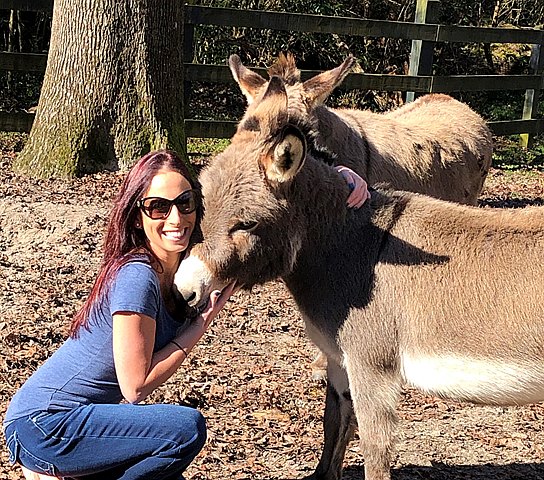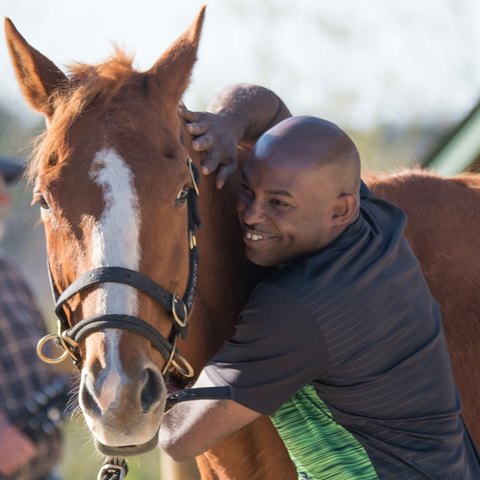The COVID-19 pandemic has inflicted unspeakable damage to everyday life in America and the rest of the world throughout 2020.
For the frontline workers in hospitals and medical offices, it took an already stressful job, with death and terminal illnesses a commonplace occurrence, and tortured them with a loss of life on a scale unseen before and added the horrifying specter of a being in an environment where a silent, invisible killer can spread unknowingly and be taken home to loved ones.
For some members of our country's National Guard who were pressed into service to join the battle against the spread of the novel coronavirus, the pandemic presented the same array of horrific situations and brought back painful memories of their duty in combat areas.
Seeing what was happening to the men and women of the home-based military, Allison Cherkosly, executive director and CEO of the not-for-profit Saratoga WarHorse organization, sprang into action. Having a program with a proven track record for helping veterans of military service overcome post-traumatic stress, Saratoga WarHorse has expanded its free program to include National Guard members in its healing experience which utilizes off-the-track Thoroughbreds.
"When the National Guard began responding to help fight the pandemic, we realized there were a lot of similarities between their experiences and someone who might have been deployed in a war zone," Cherkosly said. "We did some research on natural disasters, SARS and frontline responders and what we found was that it was similar to treating the military. The first 18 months are vital to avoid negative consequences down the line which we equate to PTS. We want to help members of the National Guard before these problems get worse down the line."

To that end, Saratoga WarHorse partnered with the Maryland National Guard and since Nov. 10 it has offered its program to their members at SWH's Baltimore farm.
"What we anticipate, based on our track record and history, is that the ones who come through our program will have a better quality of life because they can cope with problems they face and some will stay in the military longer," Cherkosly said. "They will require less services and disability from the Veterans Administration, which spends hundreds of thousands of dollars per year treating these veterans while our program only costs about $3-4,000."
To date, the Baltimore location has serviced eight National Guard members and Cherkosly said plans are in the works to add the National Guard component to its farms in Aiken, S.C., and Saratoga, which is located in East Greenbush, N.Y., in March.
She's also working on creating a control group of military members who do not participate in the program to judge the differences in how they and program alums transition to life back home.
"It should give us a level of credibility about the way veterans respond to our program," Cherkosly said.
Speak to one of the 1,300 veterans who have been through the three-day program since 2013 and you'll hear all the praise anyone needs for it.
Saratoga WarHorse, which is funded by charitable donations, generates a healing process in veterans mentally scarred by combat experiences or Military Sexual Trauma who struggle to adapt to civilian life by providing a one-on-one interaction with a Thoroughbred in the confined area of a pen.
By overcoming whatever apprehension there might be between the Thoroughbred and the veteran, eliminating that fear through a simple act such as petting or nuzzling can work wonders for both the human and the equine.
"We are re-setting a circuit-breaker in the brain for the veteran and the horse. We initiate a stressful situation by putting the veteran in a pen with a 1,200-pound animal and it is a small enough area that they feel the pressure of the horse being there and it initiates the stress. But the goal is to get the horse to connect with the veteran. With horses being intuitive and prey animals, they will not come toward a human who gives off negative energy. They will flee," Cherkosly said. "But the veteran is forced to get through this experience and eventually trigger the relaxation response in the horse. When the horse makes physical contact with the veteran that is our indication the bond has taken place. It can take five minutes or hours to connect, but it always happens. it's just a matter of how and it gives both the veteran and the Thoroughbred a sense of bonding and trust."
Steve Houghton served in the U.S. Army for 20 years, all of it in active service with multiple deployments to Iraq and Afghanistan before he retired in Nov. 2016. When he resumed civilian life, he endured rough days and was treated at a brain injury clinic and participated in PTS and PTSD groups when he heard about Saratoga WarHorse.
He joined the Aiken program in March 2017 and called it "life-changing."
"In the military, what you see and experience never leaves you. No one is ever ready to be surrounded by death," the 43-year-old Houghton said. "Saratoga WarHorse takes all of your pain and frustrations and everything you are going through and it takes it all away while you are in there in the round pen with the horse. When you're done with the program you can start over.
"It's like if you were stuck in life with nowhere to go, it's a step in the right direction for you," he added. "I still go to therapy but I got so much out of it in that one-time experience at Saratoga WarHorse. You learn to trust the horse, and they trust you. Among the problems veterans have is that they do not trust people anymore. But you go in there, and let everything go."

The three days he spent at Saratoga WarHorse left such a deep and meaningful impact on Houghton that he took a job with the organization and is now the program coordinator for the Aiken location.
"I got so much out of it," Houghton said. "I wanted to stay on and help as many people as I can."
Cherkosly said the therapy can be equally beneficial to the Thoroughbreds, who belong to organizations such as ReRun Thoroughbred Adoption. Some of the equines are adjusting to life away from the racetrack while others, in dire cases, were rescued from kill pens.
"The horses have a lot in common with the veterans. They are also transitioning after knowing one life for a longtime and when it's over they don't know what to do. They need a way forward because the rest of their life is ahead of them," she said. "So the veterans who come through the program are helping the horses as much as the horses are helping them. And it makes the veterans feel proud and good. As a soldier, we are taught to never show weakness, so to be able to do some good in a program, not just take some resources out of something, is important."
In talking about soldiers, Cherkosly can say "we" because she is an Army combat veteran who served in Afghanistan and understands the problems veteran face even when they return to what should be the safe and comfortable surroundings of their home and family.
"When I got home, two months later I was at a business meeting, and I heard rounds from someone shooting at birds. I reacted and went under a table and into a crouching position to shoot. There's a lot of flashbacks for veterans," Cherkosly said. "There's an adrenaline rush in combat. You need to be on edge in a combat environment. That's how you survive. But then you come home and that adrenaline is no longer a good thing. It's a burden. You can't focus on your job, your relationships because you are focused on surviving. We want to reset the brain so that it doesn't trigger the fight or flight response. Our goal is a relaxation response by filling the body with hormones that counteract the adrenaline. Once you start doing it, it becomes muscle memory that you retain."
Though Tina Mott, a longtime supporter and volunteer and the wife of Hall of Fame trainer Bill Mott, joined the SWH Board last month, for the most part, the organization is comprised of veterans like Cherkosly, which adds to the comfort level for participants.
"We know first-hand what veterans have experienced by going through it ourselves, so it offers us a level of credibility that research has showed veterans respond better to," Cherkosly said.
Though the battles overseas are over for Cherkosly, joining Saratoga WarHorse and the fight to help veterans—and now National Guard members—has been so therapeutic and uplifting that the days of instinctively assuming a firing position are a distant memory.
"This is the greatest job I've ever had or could want to have," Cherkosly said. "It marries my two passions, veteran care and animal welfare. I can see with my own eyes the benefits. There are hundreds of success stories for the veterans and the animals. I see veterans walk in scared, shaking, crying and now they are living fine everyday lives. What could be better than that?"









